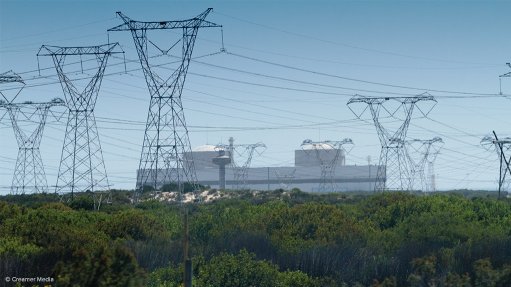
Photo by: Duane Daws
South Africa’s Department of Energy (DoE) and Russian nuclear energy firm Rosatom have further strengthened their nuclear energy alliance, this week signing two memoranda of understanding (MoU) on cooperation in training personnel for the South African nuclear power industry and in enhancing public awareness of nuclear energy in South Africa.
The agreements, which were inked on the sidelines of the seventh Brazil, Russia, India, China and South Africa, or Brics, Summit, currently under way in Russia, followed earlier agreements between the countries in which they agreed to intensify cooperation in the field of nuclear energy, and came as South Africa continued to advance preparations for its contentious nuclear energy build programme, which aimed to add 9 600 MW of electricity to the national grid.
The Russian State-owned energy group was one of several vendor countries vying to secure major build projects under the multibillion-rand nuclear programme.
Critics have, however, questioned whether South Africa had the financial, technical, human resource and safety capabilities to implement its ambitious nuclear programme, while reservations lingered about whether the programme could be pursued in the absence of political interference and corruption.
According to a statement released by the DoE on Thursday, the most recent agreements set out Russia and South Africa’s intention to implement several joint projects for education in the local nuclear power industry.
The countries would cooperate to provide training for five categories of specialists for the South African nuclear industry: nuclear power personnel, engineers and construction workers, staff for operations not related to the power industry, personnel for nuclear infrastructure, students and teachers.
“[Under the first MoU], both parties will [also] strive to realise education programmes for 200 South African candidates at Russian universities and educational organisations.
“The agreement also stipulates the development of educational materials and scientific literature on nuclear power, student exchange programmes for students of various levels of training, organisation of internships and summer courses, student competitions and teacher training,” the statement read.
The second MoU stipulated joint efforts by the parties to promote nuclear power in South Africa, increasing the awareness of local residents of modern nuclear technologies used in the power industry and in other industries, and “ensuring public acceptance of nuclear power”.
“In particular, the parties have agreed to work out a plan for the implementation of a joint communication programme to be launched in South Africa. The programme will involve the organisation of roundtables and other events aimed at promoting nuclear power and modern nuclear technologies,” the department stated.
Rosatom and the DoE would, meanwhile, also consider the creation of a nuclear energy information centre in South Africa through which they would organise working visits and international conferences and exhibitions.